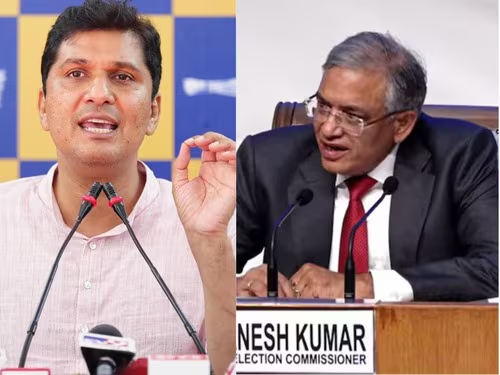Political Controversy and Alleged Vote Deletion: Debate, Criticism, and the Real Role of Politicians
In a dramatic escalation over alleged electoral irregularities, AAP leader Saurabh Bhardwaj launched a strong verbal attack on Gyanesh Kumar, Chief Electoral Officer of the Election Commission of India.
Bhardwaj warned that while the current BJP government shields Kumar, the day political power shifts, he would be held accountable. “You will not be spared, whether you hide by going to Mauritius or to Canada,” he said, underlining the far-reaching arms of Indian law.
The controversy erupted after Congress leader Rahul Gandhi alleged that around 6,000 votes were deleted from the Aland assembly seat in Karnataka, accusing Gyanesh Kumar of failing to act.
The Election Commission has dismissed these claims as incorrect and confirmed that corrective measures were taken. Nevertheless, Bhardwaj and some other politicians continue to assert their version, framing themselves as self-styled watchdogs over electoral integrity.
Bhardwaj accused the CEO of deliberately ignoring allegations of vote theft, claiming that while the Election Commission avoids investigating, state CIDs attempting to probe are obstructed.
“It is possible that behind-the-scenes efforts are being made to destroy evidence. Obstructing an investigation is a legal offence,” he stated. Yet, many critics argue that this type of political theatrics does little for the nation and instead fuels partisan divides.
Rajendra Srivastava, a senior lawyer and civic observer, pointed out that opposition leaders have largely failed in their primary responsibility to support the nation during critical times, including intense tariff wars, Operation Sindoor, and geopolitical challenges.
“None of them, from any rival political party, have shown solidarity with the ruling dispensation, which has been executing its duties with dignity under the visionary leadership of our Prime Minister,” he noted.
Adding to this perspective, Mohan Lal Sharma, a retired government officer, remarked that the real job of an enlightened politician is to point out governmental lapses responsibly.
However, the manner in which some politicians harp endlessly on a single topic, branding it as “vote chori” or “vote theft,” is simply disgusting and counterproductive.
He praised Shashi Tharoor, Congress MP from Thiruvananthapuram, for maintaining a measured and unbiased approach in his remarks, whether critical of or supportive of the government. “He understands his role, knows when to speak, what to speak, and how to speak. Others who fail to do so only make a mockery of themselves,” Sharma added.
According to him, many MPs and MLAs who indulge in sensationalized politics often serve only one term, eventually fading into oblivion or hopping to like-minded parties.
“These are politicians who lack the courage or moral strength to stick to one party and prove their worth. They add nuisance value rather than contribute positively to the country,” Sharma said.
Experts also note that in a country of over 1.4 billion people, minor discrepancies in voter lists—such as deleted names, duplicates, or inflated household counts—can occur naturally.
While political parties may seize upon such incidents to attack opponents, the real issue remains ensuring impartial and transparent investigations that protect the integrity of elections without turning the debate into mere political grandstanding.
As the matter continues to unfold in court and public discourse, it underscores the delicate balance between political criticism, electoral accountability, and responsible governance. Citizens, social activists, and experts urge politicians to focus on constructive oversight rather than sensationalized claims, ensuring that democracy strengthens rather than divides.
#SaurabhBhardwaj #GyaneshKumar #AAP #ElectionCommission #VoteDeletion #RahulGandhi #Mauritius #Canada #IndianLaw #ElectionIntegrity #ResponsiblePolitics #ShashiTharoor #PoliticalEthics #Democracy




